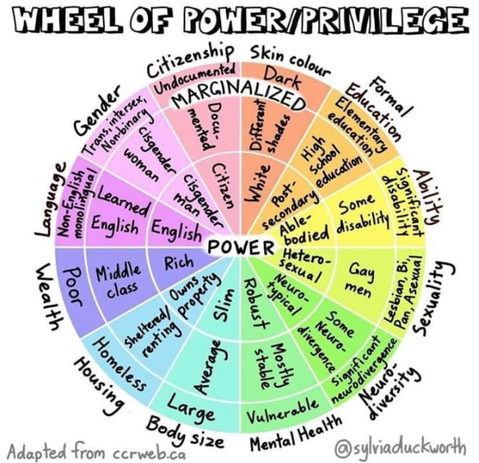 https://vpfo.ubc.ca/files/2021/03/Intersectionality.png
https://vpfo.ubc.ca/files/2021/03/Intersectionality.png
Understanding Intersectional Systems of Oppression
Intersectionality was a concept brought into academics by Black scholar Kimberlé Crenshaw in the 1990s. It explains the unique combinations of privilege and oppression that individuals experience.
For example, the experience of an indigenous drug user with a physical disability is going to be different than a white drug user with a physical disability, or a black queer woman will have a different experience than a straight black man.
Gender, race, physical ability, class, and more all add details to our experiences of the world. Creating space for the multiplicity and layers of an individual’s experiences means letting things be complex, multilayered, and come into clarity over time. Letting all of the pieces of ourselves exist in full can take more time, take more space and be messier than we may be used to.
A practical thing to remember in programming these street college offerings is to leave space for complexity by not over programming. Western capitalism has tendencies to over schedule or expect high degrees of “productivity” at all times. Decolonizing and creating intersectionally accessible programs often can look like:
- slowing things down
- scheduling time for
- contemplation
- discussion
- integration
- and complexity
Lateral violence is aggression, physical violence, emotional or psychological violence, harassment, bullying, or other forms of violent behavior between people in impacted communities. Lateral violence is often perpetrated by peers who have been harmed by colonialism, abuse, and other forms of exploitation, who seek to use those colonialist practices to gain power by taking it from others.
People who have power and are outside of the impacted community itself often encourage, foster, and facilitate lateral violence as a way of disrupting solidarity so that they can keep power. We must work together to deconstruct violence centered in harmful patriarchal and cis-heteronormative dynamics.
(https://nationalsurvivornetwork.org/definitions/#lateral-violence)
Within communities of PWLLE, lateral violence poses a significant obstacle to community organizing and, in the context of a toxic drug poisoning crisis, increases risk of harm. Internalized stigma complicates the ways that lateral violence affects PWLLE, exacerbating harms to individuals and communities.
What does lateral violence among PWLLE look like in our communities and workplaces, and how can we address it?
Lateral kindness and trauma informed lens on lateral violence with Victoria Pruden
Use tools like the First Peoples Principles of Education (https://www.fnesc.ca/wp/wp-content/uploads/2020/09/FNESC-Learning-First-Peoples-poster-11x17-hi-res-v2.pdf) to ensure that learning spaces are “holistic, reflexive, reflective, experiential, and relational (focused on connectedness, on reciprocal relationships, and a sense of place)” while working to decolonize the learning exchanges taking place.
Resources on Decolonizing and Indigenizing Harm Reduction
- Native Harm Reduction Toolkit
- https://www.fnha.ca/WellnessSite/WellnessDocuments/FNHA-Indigenous-Harm-Reduction-Principles-and-Practices-Fact-Sheet.pdf
- https://youtu.be/zp7wzxUOUE0?si=lcuKCwAytOHvIMQ7